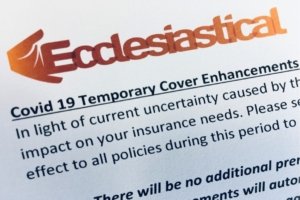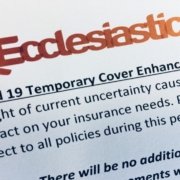Temporarily Closed Holiday Letting Properties – Updated 17th March 2021
We appreciate the significant impact that government measures to control the spread of the coronavirus is having on all businesses, not least self-catering accommodation providers and the wider hospitality and tourism industry.
With much of the UK having experienced heavy rain, snow, flooding and prolonged periods of cold / freezing weather over the past few months, risk management is especially important to avoid or minimise losses and disruption to future holiday letting at your property.
We’re here to support you
We just want to reassure you that we‘re here to support you in protecting your holiday letting property in the long term, so that when it’s safe to do so it’ll be ready to open.
So by, following the steps below whilst your self-catering property is closed to guests due to Government guidance, your cover will remain unaffected.
We do however recognise that there may be circumstances where it’s not possible for you to comply with your policy conditions, where this is the case it’s important that you contact us in order that we may discuss and agree an appropriate approach with your insurer.
Arranging for holiday letting properties to be inspected
If you do not live on site or are not local to the holiday let property, we hope that you have been able to arrange for someone in the local area, for instance a neighbour, managing agent, a housekeeper or contractor to visit your holiday let property to make the necessary internal checks on your behalf at least every 14 days.
During the winter period there are often gas safety checks, electrical inspections or other routine maintenance required to be carried out at the property. These visits can also be opportunities to have internal inspections carried out on your behalf if the contractor is happy to do this and report back to you.
At the time of writing, the latest Government guidance (which can be found here) clarifies that whilst a business may be closed to customers, closed premises can still be accessed for certain purposes including:
- Maintenance, where this is reasonably necessary; and
- Other work to ensure business readiness to open.
In addition, where it is unreasonable for a person to work from home they are permitted to travel to work, provided this can be undertaken safely and in line with the latest Government guidelines.
Unoccupancy Conditions
Insurers expect that you continue to arrange internal inspections of your property and comply with the unoccupancy conditions. With respect to your holiday home insurance policy underwritten by Ecclesiastical this means that:
- whilst the property is untenanted it must be inspected internally at least every 14 days by an authorised adult on your behalf; AND
- during the months of October to March inclusive, the heating system must be brought into constant operation to maintain a room temperature of at least 7 degrees Celsius throughout the property OR the water must be turned off at the stopcock inside the property and the domestic system drained and other services such as electricity or gas disconnected (other than as necessary to maintain central heating and security systems).
The consequences if you fail to fulfil the above conditions:
If you fail to fulfil the above conditions cover will be to damage by Fire lightning explosion earthquake and by any aircraft flying object (or items dropped from them) vehicle train or animal colliding with the buildings.
We know from many conversations that we have had with policyholders during the pandemic that the majority of holiday home owners have made arrangements to comply with the heating and inspection conditions detailed above.
Ecclesiastical have provided some reassurance and risk management guidance within a statement of intent which has been published on their website:
We hope that this provides the reassurance you need. If this action is insufficient to meet your insurance needs or if you are unsure about any other insurance issues, please speak to one of the Holiday Home Insurance Team on 01237 429444.
Any further updates or extensions will be posted on our website here.
Enhancements ended 02/12/2020
The following enhancements were only introduced for the duration of the English national lockdown period that ended on 2/12/20. These have therefore ceased and, for the avoidance of doubt, do not apply in respect of any tiered restrictions:
Premises that are temporarily closed solely due to the COVID-19 outbreak
Buildings that are temporarily closed/no longer in regular use are exposed to different and usually greater risk than occupied premises and premises that are open for regular trading.
Our standard policies define “unoccupied” premises and apply standard restrictions in cover and conditions precedent to cover that need to be complied with. Normally a higher premium is charged on unoccupied premises.
To ensure customers were not unduly penalised for temporary closures solely due to the COVID-19 full lockdown restrictions the normal terms and conditions applicable to unoccupied premises were not applied to premises that were temporarily closed.
Temporarily Closed meant premises temporarily closed solely due to the COVID-19 outbreak (and such premises were not regarded as unoccupied as defined in the Policy) during the period when the dispensations applied.
With effect from 2/12/20 temporarily closed premises must comply with all policy terms and conditions, including (but not restricted to) unoccupied premises conditions, where they fall within the normal policy definition of Unoccupied.
Please note:
1) The start of any period of unoccupancy begins from the date the premises first became unoccupied (not from 2/12/20).
2) If a premises qualifies as unoccupied on 2/12/20 the insured must comply with all policy terms and conditions for unoccupied premises immediately from 2/12/20 to maintain cover in line with the policy (unless otherwise agreed or varied by us in writing).
3) Premises that are not yet open to customers/other service users, or not yet fully used in the normal way for that premises, but does have daily occupation in line with normal working hours for that premises (such as admin/office functions are now operating, or there is a daily presence in preparing for normal operations to re-commence), will not be deemed unoccupied.
See the policy definition of Unoccupied for more details.
If in doubt please contact us via your normal channel of communication.
Outstanding risk improvements, periodic conditions and maintenance conditions – re-apply from 2/12/20 and all dispensations cease
We temporarily suspended compliance with risk improvements by the deadline specified by us, and other policy terms requiring regular maintenance or inspection, where these could not be completed during the COVID-19 lockdown because of the restrictions on movement and/or the lack of availability of contractors.
With effect from 2/12/20 the suspension of compliance will cease. Any policy term that requires regular maintenance or inspection re-applies from 2/12/20.
If the re-set deadline is not sufficient for any reason please contact us immediately.
Temporary cover enhancements for unoccupied holiday homes (Enhancements ended 02/12/2020)
 Update for Boshers holiday home insurance policyholders who are concerned about their unoccupied holiday homes which are temporarily closed due to COVID-19. We would like to reassure our policyholders in light of the most recent government advice about the outbreak of COVID-19. You may be concerned that due to the current lock down and travel restrictions, the usual inspections of your holiday let cannot take place. You may also be concerned that your policy cover may be restricted.
Update for Boshers holiday home insurance policyholders who are concerned about their unoccupied holiday homes which are temporarily closed due to COVID-19. We would like to reassure our policyholders in light of the most recent government advice about the outbreak of COVID-19. You may be concerned that due to the current lock down and travel restrictions, the usual inspections of your holiday let cannot take place. You may also be concerned that your policy cover may be restricted.
Recognising the circumstances customers find themselves in, we would not expect to see your ability to claim affected by circumstances over which you have little control. To reassure you, up to and including the 2nd December 2020 in England, Ecclesiastical have agreed that unoccupied premises cover restrictions will not apply to Temporarily Closed premises. These will equally apply to any similar lockdowns in Scotland, Wales and Northern Ireland as per the dates announced locally by the governments in these countries.
A revised letter of intent can be downloaded (as a PDF) here. The letter details the revised temporary cover enhancements for unoccupied holiday homes.
The need for an inspection or check is deferred until travel restrictions are lifted
Where government advice does not allow the necessary travel to complete an inspection or to check on the security devices, the need for an inspection or check is deferred until travel restrictions are lifted to a level which allows inspections to re-commence.
However, if your holiday home is not occupied, this represents a greater risk of significant damage which could delay your holiday home getting back up and running once the current COVID-19 outbreak has passed. With this in mind, where you are able to do so safely, and within the current government guidelines, we would encourage you to consider anything you can do to reduce the risk of damage or loss, particularly through escaping water from heating systems and security of the premises generally.
In respect of Temporarily Closed premises the following risk management measures should be implemented as far as is possible:
(1) you must maintain in full and efficient working order and keep operational all
- alarms (if fitted)
- locks and all other protective and security devices preventing access to the premises
(2) Provided any travel required to carry out an inspection is in line with the latest government advice you or an authorised person responsible to you must undertake an internal and external inspection of such buildings at least every 14 days and
- rectify as soon as is reasonably possible any defects in the fabric of the building or any protective or security devices or installations
- take action to ensure the premises cannot be easily identified as unused or closed down such as removing waste, recycling and accumulations of post.
iii. put in place contingency plans incase the primary person(s) carrying out inspections or responding to alarm activations need to self isolate or are ill so that inspections and alarm activation responses can be maintained by another appointed person
(3) you or an authorised person responsible to you will arrange that either:
(a) the heating system is brought into constant operation and a minimum room temperature of not less than 7 degrees Celsius (45 degrees Fahrenheit) maintained throughout the property or
(b) the water is turned off at the stopcock inside the premises and the domestic water system drained and other services such as electricity and gas are disconnected (other than as necessary to maintain the central heating or security system).
If you have any questions regarding this please do contact us. However in order for us to manage enquiries during a period where we are likely to be busy, please could we ask where possible that in the first instance you email info@boshers.co.uk. We will continue to update you and our website as the situation develops and thank you for your understanding at this difficult time.
Not a Boshers holiday home insurance client yet? We offer specialist holiday home insurance to owners across the UK. If you need an insurance quote for your holiday let call us on 01237 429444. If we are closed use the quote form and we’ll be in touch during the next business day.




 Update for
Update for 

